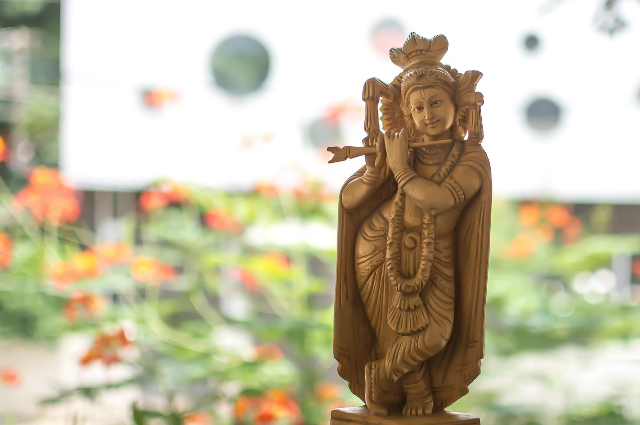
Krishna is never restricted to one role, one identity, or even one dimension. He embodies playfulness, aliveness, seriousness, joy, responsibility, love, and life itself. In India, he is not just a divine entity but a timeless guide and teacher of life.
The Bhagavad Gita, delivered by Shri Krishna on the grounds of Kurukshetra, remains one of the profound philosophical teachings. His entire life is full of curiosity, challenges, and lessons. He teaches that duty is beyond personal achievements, love must transcend possession, and a leader should be both strategic and compassionate. He never escapes life but dances through it.
In today's world, we need more of his teachings. Whether it's a leader trying to make a decision, a student confused with his choices, or a seeker looking for answers, his teachings can guide anyone. He shows that life is a play and we're here to play our characters gracefully. This article explores different dimensions of his teachings.
Krishna and His Teachings of Dharma
Dharma, the concept in Indian philosophy, is roughly translated as duty. It can be understood as right actions illuminated from the right center of being. Krishna guides Arjuna towards his dharma on the battlefield of Kurukshetra as a mentor and a friend. When Arjuna was facing the dilemma of choosing between the rightful action and his personal preferences, Krishna tells Arjuna that this war is not because of his quarrels, but it is a firm stand for justice. Thus, quitting the war would not be compassion but cowardice. Krishna defines Dharma as choosing the rightful action over and over again, beyond personal advantages and our emotional dilemmas, even when it is painful.
In your life, you may also be surrounded by many dilemmas, like a student choosing a career, an officer in a corrupt environment, or a citizen casting their vote. What should be your duty in these situations?
Leadership
Krishna shows that leadership is not only about leading but also inspiring others so they can walk towards their higher purpose with confidence. His leadership possesses profound qualities of trust, wisdom, and strategic management. His strategies were not bound by rigid moralities; for him, justice was paramount. For Dharma, he was ready to break rules and did not obey any rules mechanically. This is particularly relevant for policymakers and administrative leaders. They should not follow any rules blindly. They should balance ethics with practical wisdom. His leadership is about serving Dharma.
The Lesson of Detachment
The lesson of detachment from the fruits of action is one of the revolutionary teachings. This philosophy is an invitation to celebrate life. It is a lively engagement with life. It is the ability to perform your action wholeheartedly. A mind wandering around outcomes and results will not perform its present duty effectively. Once you choose the right action, there should be no fear of the result. But do your duty with sincerity and discipline today. During the battle of the Mahabharata, Krishna was not guiding Arjun for his benefit; rather, he was there to fulfill his duty. His joy was in performing his duty beyond his realms and in pursuit of deeper truth, justice, and humanity. He teaches us to live fully in action with clarity and to remain inwardly free.
Celebration of Life
People need occasions to celebrate, but for Krishna, life itself is a celebration. His love, playful nature, wisdom, friendship, dance, and the symphony of the flute everything is part of his leela (play). This play is life. Krishna carries the spirit of joy, encouragement, light, and calmness in his everyday life. He teaches us that music, dance, art, humor, and playfulness are necessities of life. Embrace your sacred laugh, relaxation with hobbies, and creative expression through art. Krishna guides us that celebration is not escapism from duty. A life of only duty is like a dry river, and a life solely of pleasures is a shallow lake, but what harmonizes both is the ocean of joy.
Ethical Dilemmas
Krishan not only teaches leadership but also guides us on how to face dilemmas in everyday life. There were many cases on the battlefield of Kurukshetra where we can see Krishna following a balance between principles and practicality. He teaches us that the essence of Dharma should be restored, even if it demands flexibility. For him, vows matter, but protecting Dharma matters even more. Ethics is not about rigid rules; it should involve flexible actions based on Dharma. He teaches us how to navigate through complex ethical dilemmas.
The life and teachings of Krishna are limitless, like the ocean. Every time you dive deeper, you may find something very profound and very new. He touches every aspect of life. He embraces both the role of a leader and an innocent artist. He is a creative being, a genius, a leader, teacher, guide, mentor, friend, divine, and above all, a lover. He teaches freedom from rigid moralities and encourages inviting clarity and celebration in life. His teachings are timeless as long as humanity breathes. He is walking beside us in every aspect of life.
Krishna is synonymous with holistic living. He teaches us that you can live fully yet be free. You can be fighting in battle but still be at peace. You can love passionately, yet you shouldn't indulge in possession. To learn from Krishna is not only to passively read his teachings, but it is to embody these life lessons. It is to cultivate joy, clarity, trust, justice, and love. It is to be, act, laugh, and love.
